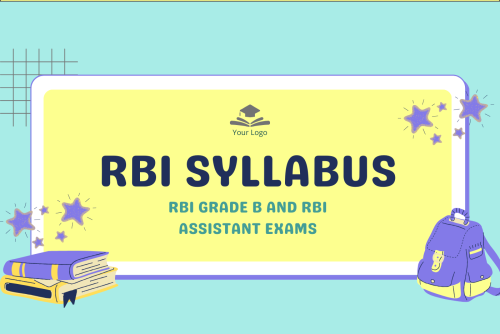The Reserve Bank of India (RBI) conducts various exams to recruit candidates for different positions within the organisation. Among these, the RBI Grade B and RBI Assistant exams are highly sought after.
Each exam has a specific syllabus designed to assess a candidate’s knowledge, skills, and aptitude relevant to the roles. In this blog, let’s discuss the detailed syllabus of RBI exams ( grade B and assistant ).
RBI Grade B Exam Syllabus
The RBI Grade B exam is conducted in three phases, including preliminary, mains, and the Interview. Each phase assesses different skills and knowledge areas.
Preliminary Examination
- General Awareness: Current affairs on National and International, Indian history and geography, Indian polity and economy, social and cultural issues and environment and ecology.
- English Language: Reading comprehension, cloze test, error spotting, sentence improvement and para jumbles.
- Quantitative Aptitude: Data interpretation, number series, arithmetic (percentages, ratios, time and work, profit and loss, etc.), Algebra and Probability.
- Reasoning Ability: Verbal reasoning, non-verbal reasoning, logical reasoning, analytical reasoning, puzzles and seating arrangements.
Mains Examination
- Economic and Social Issues (ESI): Indian economy, economic development, social issues and policies, government schemes and initiatives international economic organisations and current economic affairs
- Finance and Management (FM): Financial management, principles of management, economics, banking and financial institutions, financial markets and instruments, corporate governance and risk management.
- English (Descriptive Paper): Essay writing, precise writing, letter writing and report writing.
RBI Assistant exam
The RBI Assistant exam consists of three main stages, Preliminary Examination, Main Examination, and the Language Proficiency Test (LPT). Each phase tests different skills and knowledge areas relevant to the position.
Preliminary Examination
- English Language: Reading comprehension, cloze test, error spotting, sentence correction, para jumbles and vocabulary (synonyms and antonyms).
- Numerical Ability: Data Interpretation, simplification, number series, arithmetic (percentages, ratios, averages, profit and loss, time and work, etc.) and data sufficiency.
- Reasoning Ability: Verbal reasoning, Non-verbal reasoning, logical reasoning, puzzles, seating arrangements, coding-decoding and blood relations.
- General Awareness: Current affairs (National and International), banking awareness, financial awareness and general knowledge on geography and history.
Main Examination
- English Language: Reading comprehension, grammar, sentence formation, vocabulary (Synonyms, Antonyms, etc.), cloze test and para jumbles.
- Numerical Ability: Data Interpretation, Simplification, Number Series and arithmetic that includes percentages, ratios, time and work.
- Reasoning Ability: Puzzles, seating arrangements, coding-decoding, blood relations, syllogism and logical reasoning.
- General Awareness: Current affairs (National and International), banking and financial awareness and static general knowledge on geography, history and culture.
Language Proficiency Test (LPT)
This is a test in the official language of the state for which the candidate has applied. It is conducted to ensure that the candidate can communicate effectively in the regional language.
To crack the RBI exams, candidates should adopt a strategic preparation approach, including thorough study of the syllabus, regular practice, and staying updated with current affairs. A balanced preparation plan that covers all these aspects will enhance your chances of success and help you achieve your career goals within the RBI.
At Learn On-Line, we offer the best online and offline coaching for competitive exams like Banking exams, Railways and SSC exams. We offer 100% assistance so you can ace your competitive exams and get ahead. Want to know more about our coaching services? Get in touch with us.
FAQs on RBI Syllabus
1. What is the age limit for banking exams in India?
The age limit is 20-30 years, though this can vary depending on the exam and category of the candidate.
2. Is there a sectional cutoff in the RBI exams?
Yes, both RBI Grade B and RBI Assistant exams generally have sectional cutoffs in addition to an overall cutoff.
3. Are there any negative markings in banking exams?
Yes, most banking exams have a negative marking scheme, typically deducting 0.25 marks for each wrong answer.
4. How often are banking exams conducted?
Most major banking exams are conducted annually.
5. Can I apply for multiple banking exams simultaneously?
Yes, you can apply for multiple banking exams if you meet the eligibility criteria for each.

